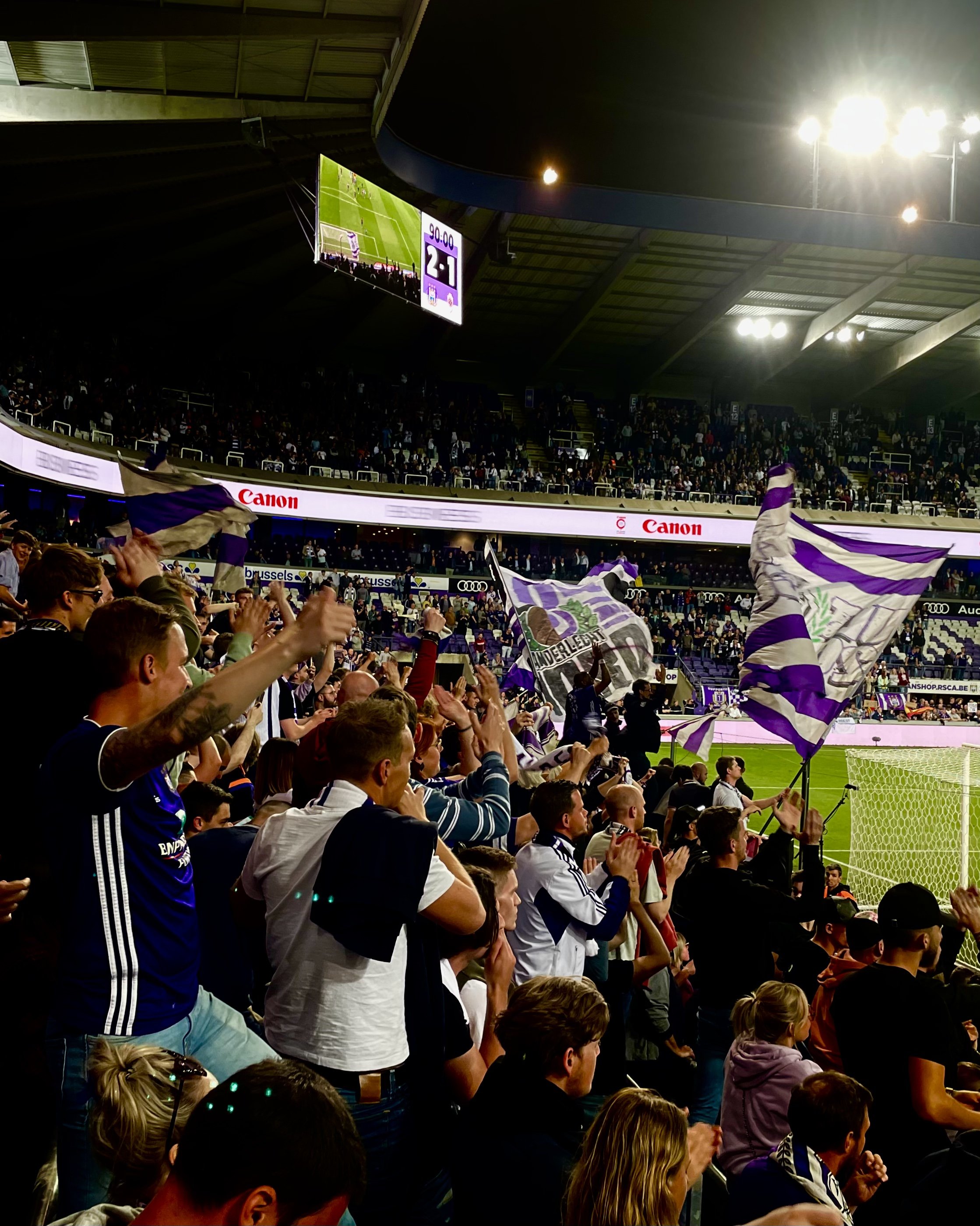Chips and Jupiler in Anderlecht
What’s wrong with just chips anyway? As a bona fide Northerner, the only acceptable dressing for chips is, of course, gravy. Thick gravy too, none of that watered-down nonsense your aunty brings out for a Sunday dinner. Actual, proper gravy.
But as I stood there, cash in hand, transaction already agreed upon, the walls of reality were about to cave in. I only wanted some chips, maybe a healthy sprinkle of salt, but just chips would do.
“Just fries?” the vendor shrieked.
“Oui,” I replied.
“No sauce?” she continued.
“No, thank you,” I offered in response.
Silence.
A quick glance down to see what sauces were on offer didn’t tempt me away from my original order. Amongst the cult classics like ketchup and mayonnaise, sat an array of exotic sauce variations. Tartar, andalouse, samurai, joppieaus and American sauce – whatever abomination that might be - all lined the counter.
Admittedly, looking back, the chips were quite dry and a helping of sauce may or may not have improved my dining experience. But, amongst the disgruntled looks I’d received, it was my first insight into the way Belgian football operated.
‘Just chips’ may have been an inoffensive request from an English tourist looking for a quick bite before a football match, but it was also an affront to a culture generations of Brusseleers had worked tirelessly to carve.
Finding Anderlecht
A walk around the leafy district of Anderlecht offers a quaint escape from the bustling Brussels streets. Less than three miles from the city centre, the medieval townhouses and well-kept parks provide sharp contrast to the concrete jungle of Belgium’s capital.
Historic, but not obnoxious, Anderlecht feels like a city within a city, and in truth, it kind of is. Far enough away from the centre to feel detached, the shops, bars and cafes that line the streets appear distinctly Anderlecht. Where the mass regeneration of Brussels rumbles in on the distance, with cranes punctuating the city skyline, Anderlecht remains in touch with its past, embracing its centuries old heritage.
But everything changes on matchday.
With the closest metro station a short walk from the 21,500 capacity Lotto Park Stadium, it was a case of following the purple and white ladened crowd, as they meandered through the streets of Anderlecht, the early-summer sun poking through the gaps between buildings.
While the roads that circle the stadium are navigable on matchdays, the sea of supporters lining the streets makes them all but impassable. An expectant crowd, almost all grasping at least one plastic pint cup, filled with Jupiler Pils – Belgium’s favoured lager and the primary sponsor of the Belgian Pro League – the hum of chatter would occasionally break into song, as the masses flipped from conversation, to a chorus of vocal support.
The match itself was an important one. Anderlecht, who had been dumped out of the Europa Conference League at the qualification stage earlier in the campaign, knew a victory against fellow European hopefuls Royal Antwerp would secure a route back into continental football.
Given the complexities of the Pro League’s formatting, Anderlecht had already played, and beaten Antwerp in the week leading up to this clash, with the Brussels-based side running out 4-0 winners. An anomaly for most leagues in Europe, Belgium’s top-flight splits off into playoffs at the end of the regular campaign, with the top four entering the ‘Championship Group’.
Awarded a starting number of points based on a club’s final position in the usual 34-game season, the structure allows any side that qualifies for the Championship Group, to still go on and win the league title in the fixtures that remain. A little confusing, but a format that makes for added tension. Results in previous weeks had effectively ruled both Anderlecht and Antwerp out of title contention. Still, the hosts remained confident of securing a European berth with three games of the season left to play.
Europe: The Final Countdown
A constant in continental competitions since the mid-1960s, the 2019/20 campaign represented Anderlecht’s first without European football in 56 years. One-time winners of the UEFA Cup, while two-time victors of the UEFA Cup Winners’ Cup, Anderlecht’s connection with Europe stretches further than their record on the pitch.
Brussels itself has acted as the beating heart of the European Parliament since 1992, with a chunk of the organisation’s legislative decisions taking place in the city’s Espace Léopold building. While Euroscepticism is commonplace in Belgian politics, its impact is relatively low compared to other neighbouring nations, with Belgium predominantly proud of its European heritage.
A city with strong continental connections, Anderlecht had for a long time shared its status as European royalty, until financial mismanagement around the mid-2010s plunged the club into crisis. Poor results on the pitch were coupled with mounting debts, as Anderlecht quickly saw their status as Belgium’s most famous club begin to shrink. Perhaps the low point for the side from the capital came in the spring of 2019, when Belgian police raided the club’s headquarters in relation to a money-laundering investigation.
In need of a solution, the club’s hierarchy turned to legendary Manchester City defender Vincent Kompany to rescue the sinking ship. Revered by the Mauve faithful, the Belgian international had spent six years with Anderlecht as a player, before moving on.
Originally signing for Anderlecht as a player-manager, complications around the defender’s coaching badges meant Kompany would be forced to step away from in-game managerial duties. What had started as a hero’s return for Kompany was quickly descending into mass chaos, as the issues that had plagued Anderlecht off-the-pitch, transferred over to their results. The 2019/20 campaign started with their worst start to a league season since 1998, with pressure mounting on Kompany’s shoulders.
It's impossible to say exactly what saved Kompany’s tenure at Anderlecht. Credit in the bank built up from his time there as a player? Possibly. But as the world began to lock down in the spring of 2020, the time away from football offered a reprieve for Kompany’s spell as boss. Anderlecht would end the season in eighth, after the Pro League decided not to complete the campaign, yet the Anderlecht that would return after lockdown would both look and feel like a completely different entity.
Ahead of the 2020/21 campaign, Kompany retired from playing and took up the role of Anderlecht manager full-time. With a manifesto of developing youth players and returning the club to European football, a rejuvenated Anderlecht side climbed the table, before finishing the season with qualification for the Europa Conference League. A first cup semi-final appearance since 2014/15 represented another step in the right direction for Anderlecht, as Kompany was slowly, but surely, returning the Mauve to the upper echelons of Belgian football.
It wasn’t to be for Anderlecht in the Europa Conference League qualifiers, as they sunk to an aggregate defeat against Dutch side Vitesse at the end of August, denying them a place in the group stage. Fast forward nine months and Kompany’s Anderlecht side once again stood on the brink of European qualification.
A Purple and White Love Story
As a match-going football fan from England, the concept of drinking in the stands is something that I’ve never been able to enjoy while watching my own side. The chance to drink a pint while watching teams on the continent has always been a plus point to taking in football abroad. However, the first inkling that things were done differently in Belgium came before I’d even entered the stadium, as supporters were able to carry the beer they’d been drinking on the streets outside the ground, onto the terraces with them.
Alien from the match-day experience I’d come to expect as a supporter from England, there was no need for any last-minute sinking of pints to avoid missing kick-off, or doubling up in the pub to make sure you got enough drinking time in before the match. Treating fans as adults, instead of the usual immature approach adopted by authorities, was a welcome touch.
I should have known from that moment I’d eventually leave Lotto Park later that night with Anderlecht having etched a place in my heart, but as I ambled up the Tribune 4 steps - the entrance used by the Anderlecht ultras - and onto the concourse, there was a feeling of overwhelming affection. The paint stripped walls were grimy, the speakers blaring out mid-00s European dance music were piercing, and the all-black clad supporters moved with an aura of intimidation. Still, everything felt just right.
A place where passion from supporters is encouraged, not frowned upon, the Anderlecht fans had packed the standing terrace behind the goal well before the players made their way out onto the pitch. Flags and banners flooded the view in front, all sporting the club’s unique purple and white colour scheme. Chants were a constant from the first whistle to the last, with an over-zealous (and often shirtless) Capo dictating proceedings from a platform built out of scaffolding just behind the net.
As for the match itself, Anderlecht won, apparently. A 2-0 victory over Antwerp, that included some late VAR drama to deny the visitors a route back into the game. But the evening felt much bigger than that. From the fans on the terrace, to the manager on the sideline and the players on the pitch, it was about redemption. In truth, Anderlecht is far too big a club to be satisfied with a place in the Europa Conference League and their 34 Belgian league titles suggest that more than anything, but they were once again moving in the right direction. From Belgian youth internationals dictating proceedings, like Francis Amuzu who netted the hosts’ second of the game, to a manager who understood what it meant to be Anderlecht, the passion from the supporters matched the confidence of a club whose identity had been restored.
Time might not stand still for anybody, and football may be the fastest moving industry of them all, but as I stood surrounded by emotional Anderlecht fans, the scarf I had purchased pre-match now swinging above my head, football once again felt real. I’d entered the stadium that evening as a tourist who just wanted a portion of chips, I left an Anderlecht fanatic.




